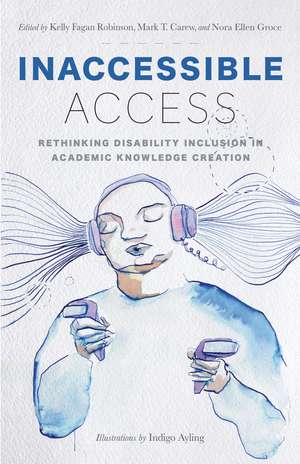Inaccessible Access: Rethinking Disability Inclusion in Academic Knowledge Creation
Editat de Kelly Fagan Robinson, Mark T. Carew, Nora Ellen Groce Ilustrat de Indigo Ayling Cuvânt după de Michele Friedner Contribuţii de Carol Rivas, Julia F. Sauma, Julia K. Modern, Valéria Aydos, Harshadha Balasubramanian, Rebekah Cupitt, Sara M. Acevedo, Sumi Colligan, Valerie Black, Nell A. Koneczny, Erin L. Durban, Krisjon Olson, Mark R. Bookmanen Limba Engleză Paperback – 15 noi 2024
Preț: 169.29 lei
Nou
Puncte Express: 254
Preț estimativ în valută:
32.40€ • 33.57$ • 27.04£
32.40€ • 33.57$ • 27.04£
Carte disponibilă
Livrare economică 01-15 martie
Livrare express 15-21 februarie pentru 20.25 lei
Preluare comenzi: 021 569.72.76
Specificații
ISBN-13: 9781978841451
ISBN-10: 1978841450
Pagini: 206
Ilustrații: 8 color and 3 B-W images
Dimensiuni: 140 x 216 x 15 mm
Greutate: 0.25 kg
Editura: Rutgers University Press
Colecția Rutgers University Press
ISBN-10: 1978841450
Pagini: 206
Ilustrații: 8 color and 3 B-W images
Dimensiuni: 140 x 216 x 15 mm
Greutate: 0.25 kg
Editura: Rutgers University Press
Colecția Rutgers University Press
Notă biografică
KELLY FAGAN ROBINSON is a Leverhulme Early Career Research Fellow and an affiliate lecturer in the Department of Social Anthropology at the University of Cambridge.
MARK T. CAREW is an assistant professor at the International Centre for Evidence in Disability at the London School of Hygiene and Tropical Medicine. He is a coauthor of Disability and Sexual Health: A Critical Exploration of Key Issues and coeditor of Physical Disability and Sexuality: Stories from South Africa.
NORA ELLEN GROCE is the Leonard Cheshire Chair of Disability and Inclusive Development at University College London. She is the author of Everyone Here Spoke Sign Language: Hereditary Deafness on Martha's Vineyard and a coauthor of Accessible Connecticut: A Guide to Recreation for Children with Disabilities and Their Families.
MARK T. CAREW is an assistant professor at the International Centre for Evidence in Disability at the London School of Hygiene and Tropical Medicine. He is a coauthor of Disability and Sexual Health: A Critical Exploration of Key Issues and coeditor of Physical Disability and Sexuality: Stories from South Africa.
NORA ELLEN GROCE is the Leonard Cheshire Chair of Disability and Inclusive Development at University College London. She is the author of Everyone Here Spoke Sign Language: Hereditary Deafness on Martha's Vineyard and a coauthor of Accessible Connecticut: A Guide to Recreation for Children with Disabilities and Their Families.
Cuprins
Preface
Mark T. Carew
Introduction
Kelly Fagan Robinson
1. Blended Models and the Co-Construction of Hidden Disability in Higher Education Settings
Carol Rivas
2. Performing Normal: Deafness, Intersectionality, and Academic Exhaustion
Julia F. Sauma
3. Making Space for Chronicity: Financial and Administrative Barriers to PhD Study
for People with Long-Term Health Conditions in the United Kingdom
Julia Modern
4. Agency and Subjectification in the Management of People with Disabilities: Inclusion of a Young
Man Diagnosed with Autism in the Labor Market
Valeria Aydos
5. Against Frictionless Access to Fieldwork: An Ethnography of Audio Describing Virtual Reality
Harshadha Balasubramanian
6. Video Meetings: Access and Disrupture
Rebekah Cupitt, Sara M. Acevedo, Sumi Colligan, Valerie Black, Mark Bookman, Erin L. Durban, Nell Koneczny, and Krisjon Olson
7. Access Killjoys: Join the Club
Michele Friedner
Acknowledgments
Notes on Contributors
Index
Mark T. Carew
Introduction
Kelly Fagan Robinson
1. Blended Models and the Co-Construction of Hidden Disability in Higher Education Settings
Carol Rivas
2. Performing Normal: Deafness, Intersectionality, and Academic Exhaustion
Julia F. Sauma
3. Making Space for Chronicity: Financial and Administrative Barriers to PhD Study
for People with Long-Term Health Conditions in the United Kingdom
Julia Modern
4. Agency and Subjectification in the Management of People with Disabilities: Inclusion of a Young
Man Diagnosed with Autism in the Labor Market
Valeria Aydos
5. Against Frictionless Access to Fieldwork: An Ethnography of Audio Describing Virtual Reality
Harshadha Balasubramanian
6. Video Meetings: Access and Disrupture
Rebekah Cupitt, Sara M. Acevedo, Sumi Colligan, Valerie Black, Mark Bookman, Erin L. Durban, Nell Koneczny, and Krisjon Olson
7. Access Killjoys: Join the Club
Michele Friedner
Acknowledgments
Notes on Contributors
Index
Recenzii
"With ethnographic detail and theoretical rigor, Inaccessible Access makes an essential contribution to critical access studies, showing that disability inclusion, equity, and justice are much more complicated than legal regimes make them out to be. A must-read for students, faculty, and administrators in higher education."
"As universities charge their offices of disability services with the challenge of advising instructors on reasonable educational accommodations, too often disabled students experience a yawning gap between what is provided and what they actually need. Inaccessible Access thoughtfully and wisely enters into that gap, or those many gaps, to explore, document, and problematize the complex terrain. This book launches a much-needed conversation about how universities can better accept, value, and support disabled students."
"As universities charge their offices of disability services with the challenge of advising instructors on reasonable educational accommodations, too often disabled students experience a yawning gap between what is provided and what they actually need. Inaccessible Access thoughtfully and wisely enters into that gap, or those many gaps, to explore, document, and problematize the complex terrain. This book launches a much-needed conversation about how universities can better accept, value, and support disabled students."
Descriere
Inaccessible Access ethnographically addresses barriers to inclusion within knowledge-making. It focuses on the social, environmental, communicative, and epistemological barriers that people with disabilities confront and embody throughout the course of their learning, living and in the specific context of their Higher Education Institutions and in research.
